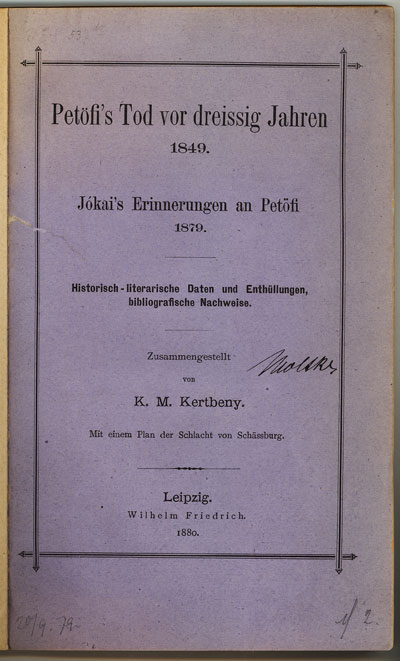Difference between revisions of "Wilson Collection: Karl Kertbeny and Karl Ulrichs"
(Karl Kertbeny and Karl Ulrichs) |
(Karl Kertbeny and Karl Ulrichs) |
||
| Line 7: | Line 7: | ||
'''Karl Kertbeny and Karl Ulrichs''' | '''Karl Kertbeny and Karl Ulrichs''' | ||
| − | Viennese writer Karl Maria Kertbeny coined the word “Homosexualität” (“homosexuality”). | + | Viennese writer Karl Maria Kertbeny coined the word “Homosexualität” (“homosexuality”).<ref>Rictor Norton, ''The Myth of the Modern Homosexual: Queer History and the Search for Cultural Unity'' (Washington: Cassell, 1997), 67.</ref> He debuted it publicly in his 1869 pamphlet calling for homosexual emancipation. He first used it in an 1868 private letter to a German journalist named Ulrichs. He also coined the word “Heterosexualität” (heterosexuality).<ref>Norton, 67.</ref> |
| − | Karl Heinrich Ulrichs dared to “come out” publicly. “With [his] breast pounding,” he did it before an audience of German jurists in 1867. | + | Karl Heinrich Ulrichs dared to “come out” publicly. “With [his] breast pounding,” he did it before an audience of German jurists in 1867.<ref>Hubert Kennedy, ''Ulrichs: The Life and Works of Karl Heinrich Ulrichs: Pioneer of the Modern Gay Movement'' (Boston: Alyson Publications, Inc., 1988), 107.</ref> In mid-century he published pamphlets defending what he termed “Urning” (or in English, “Uranian”) love, a concept inspired by Plato's Symposium.<ref>Norton, 65.</ref><ref>Norton, 66.</ref> |
| − | Ulrichs denounced “despotic majorities” who oppress minorities. | + | Ulrichs denounced “despotic majorities” who oppress minorities.<ref>Kennedy, 172.</ref> Jailed for his homosexual-rights activism, he declared, “I am an insurgent. I rebel against the existing situation, because I hold it to be a condition of injustice...I call for the recognition of Urning love...from public opinion and from the state.”<ref>Kennedy, 70.</ref> |
| − | ''References'' | + | ==''References''== |
| − | + | <references/> | |
| − | |||
| − | |||
| − | |||
| − | |||
| − | |||
| − | |||
| − | |||
Revision as of 16:18, 6 November 2012
(Partial translation: [Hungarian poet] Petofi’s Death Thirty Years Ago in 1849…Historical-Literary Data and Discoveries Compiled by K.M. Kertbeny, 1880)
Under construction.
Karl Kertbeny and Karl Ulrichs
Viennese writer Karl Maria Kertbeny coined the word “Homosexualität” (“homosexuality”).[1] He debuted it publicly in his 1869 pamphlet calling for homosexual emancipation. He first used it in an 1868 private letter to a German journalist named Ulrichs. He also coined the word “Heterosexualität” (heterosexuality).[2]
Karl Heinrich Ulrichs dared to “come out” publicly. “With [his] breast pounding,” he did it before an audience of German jurists in 1867.[3] In mid-century he published pamphlets defending what he termed “Urning” (or in English, “Uranian”) love, a concept inspired by Plato's Symposium.[4][5]
Ulrichs denounced “despotic majorities” who oppress minorities.[6] Jailed for his homosexual-rights activism, he declared, “I am an insurgent. I rebel against the existing situation, because I hold it to be a condition of injustice...I call for the recognition of Urning love...from public opinion and from the state.”[7]
References
- ↑ Rictor Norton, The Myth of the Modern Homosexual: Queer History and the Search for Cultural Unity (Washington: Cassell, 1997), 67.
- ↑ Norton, 67.
- ↑ Hubert Kennedy, Ulrichs: The Life and Works of Karl Heinrich Ulrichs: Pioneer of the Modern Gay Movement (Boston: Alyson Publications, Inc., 1988), 107.
- ↑ Norton, 65.
- ↑ Norton, 66.
- ↑ Kennedy, 172.
- ↑ Kennedy, 70.
